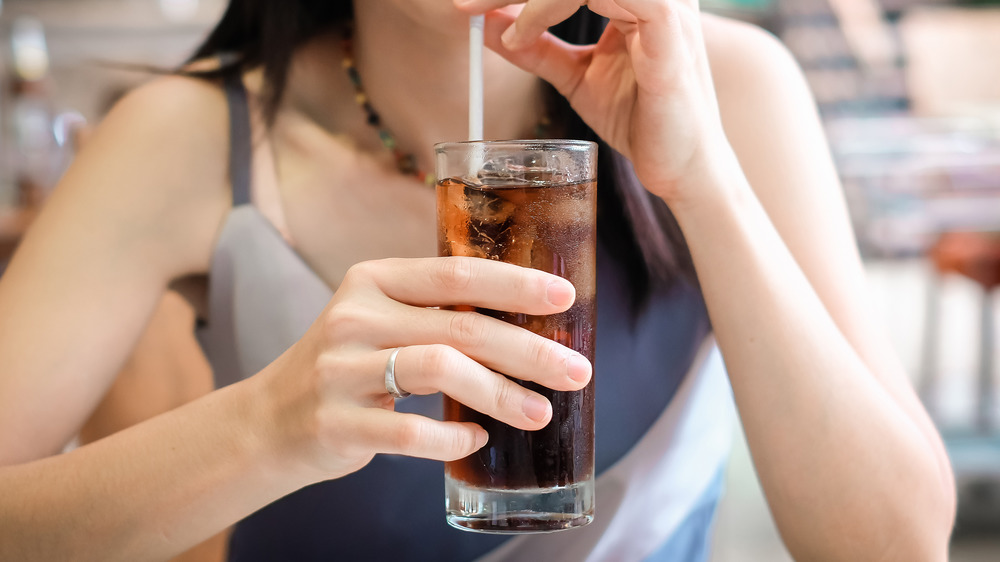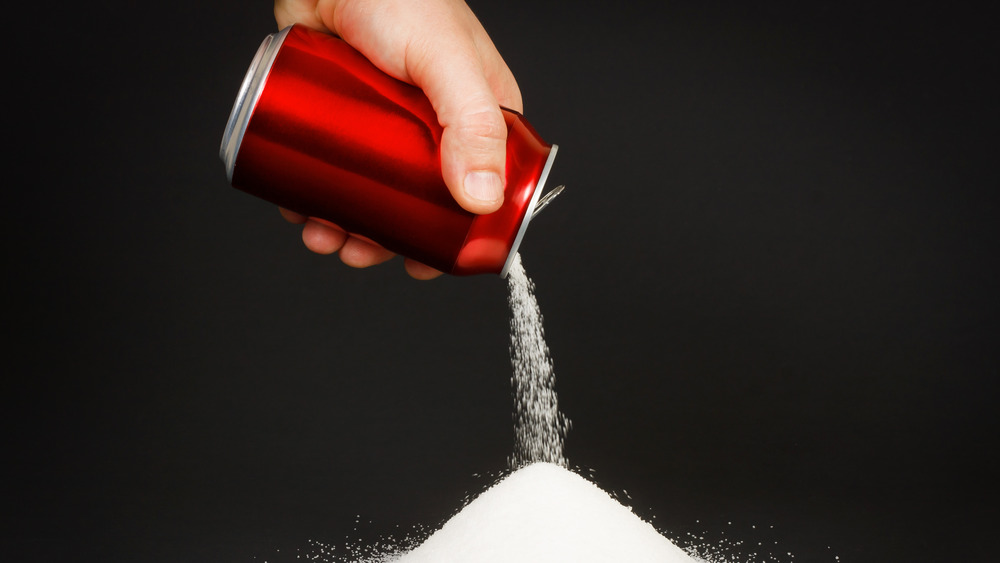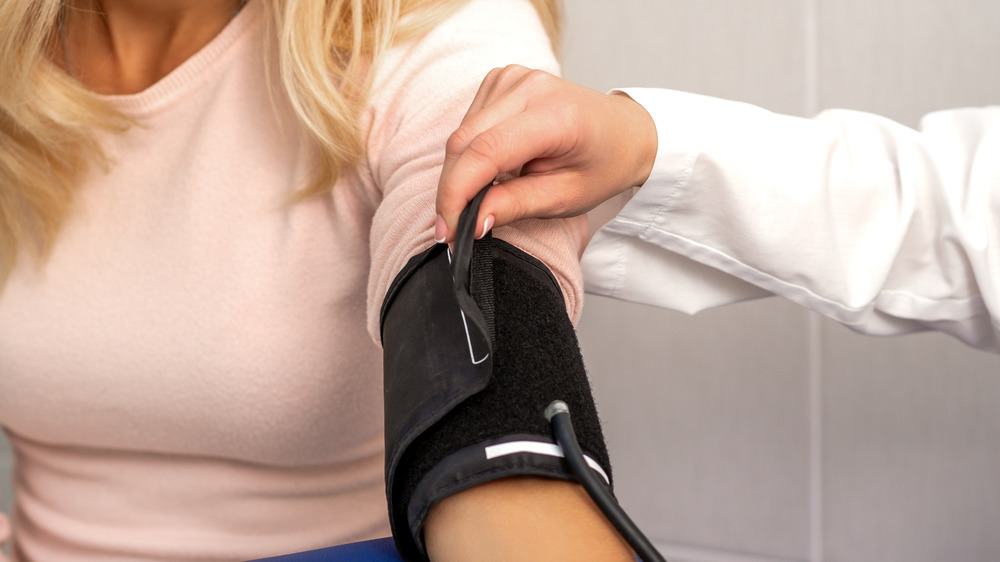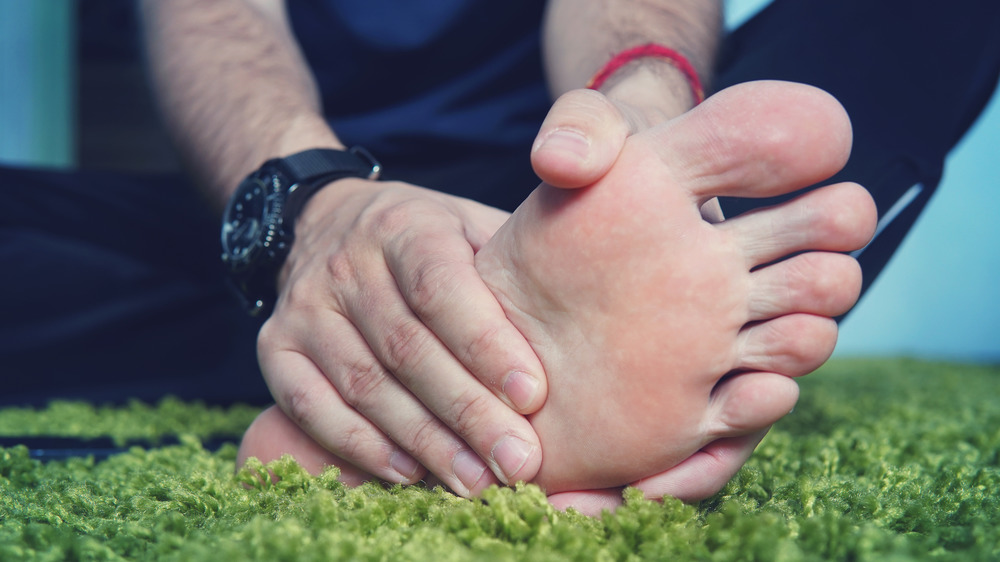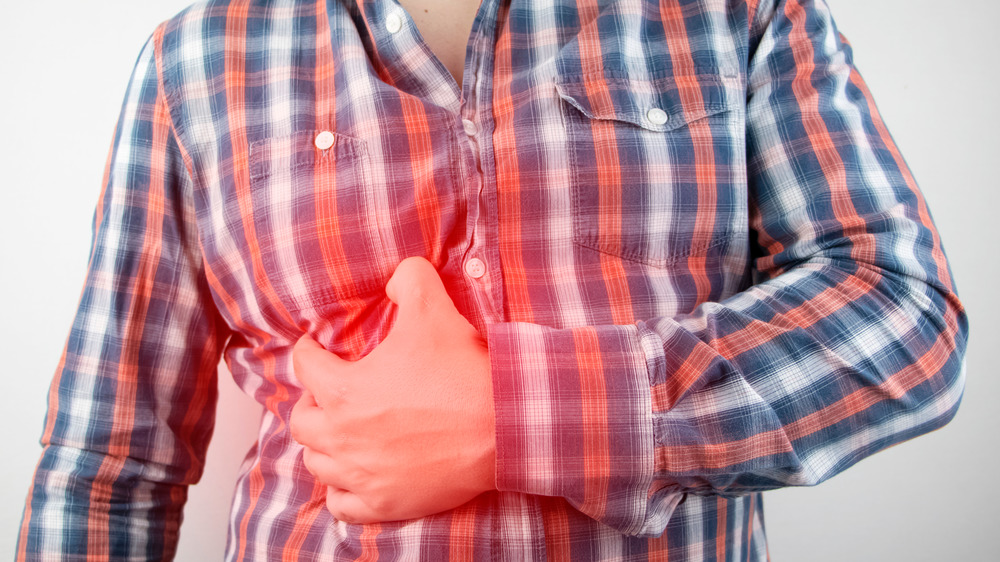You're Drinking Too Much Soda If This Happens To You
When Coca-Cola soda was introduced in 1885 as a sweetened cocaine-based carbonated beverage, both cocaine and carbonation were considered supportive of good health, according to River Oaks Treatment Center. Cocaine became illegal in 1914 and was phased out of Coke by 1929 (via National Institute on Drug Abuse). Still, Coke wasn't yet considered unhealthy. It even enjoyed a bit of a halo throughout Prohibition because, well, at least it wasn't alcohol.
Capitalizing on Coke's success, the soda industry blossomed. But the health halo disappeared in 1942, when the American Medical Association called out sugary soft drinks (all of them, not just Coke), for being too high in sugar, as a 2007 study in the American Journal of Public Health highlighted.
Nevertheless annual soda consumption exploded between 1950 and 2000, per a report in Advances in Nutrition. Guess what also rose during that time? If you guessed the rate of obesity, you're correct, according to a 2007 study published in the American Journal of Medicine. Of course, weight gain is just one of the side effects of drinking too much soda. But how do you know if you're drinking too much soda? If any of the following things happen to you, it's a pretty good indication that you should slow down on the soda.
Drinking too much soda can lead to a whole host of dental issues
The sugar in soda interacts with bacteria that occurs naturally in your mouth to create acids. These acids attack teeth by softening the enamel surface and causing decay, which manifests in painful dental issues like cavities (via Healthline). However, soda also contains acid, which keeps damaging teeth for up to 20 minutes after you stop drinking it, according to the Wisconsin Dental Association.
Even if you don't "sip all day," as the association warns against, soda is still harmful to your teeth. And brushing right afterward won't help. In fact, brushing immediately after drinking soda can do more damage. "The friction from brushing could potentially cause more harm as the teeth are vulnerable from the sugar and acid attacking them," according to the dental professionals of Manatee Dental.
While Delta Dental, America's largest dental insurer, won't go so far as to recommend completely eliminating soda, you should know that the more you drink, and the more often you drink it, the more you're putting your teeth in harm's way. The bottom line: If you're a soda drinker and are experiencing tooth sensitivity or other signs of enamel erosion, or if you're getting cavities, it could be a sign you've been drinking too much soda (via Healthline).
If your pants are getting too tight around the waist, it could mean you've been drinking too much soda
Sugar from soda that you're not using for energy can get stored in and around the abdominal organs (known as visceral fat) according to registered dietitian and health coach Cassie Christopher. Christopher's view is supported by a 2016 study published in Circulation. That doesn't mean you should turn to diet soda, though.
Although the scientists in the 2016 study found no such association with regard to diet soda, a 2015 study published in Nutrients, which followed nearly 800 seniors over a nine-year period, found that those who drank diet soda gained almost three times more belly fat than their cohorts who did not.
"Visceral fat is related to an increased risk of such chronic conditions as heart disease, diabetes and some types of cancers," Christopher told Health Digest, all of which are associated with metabolic syndrome — and excess belly fat is a risk factor (along with high blood sugar, elevated cholesterol, and hypertension). So if you're noticing it's getting harder to close that top button on your jeans or you've been progressively loosening your belt, it's a sign that whatever amount of soda you've been drinking may be too much.
Even diet soda can lead to weight gain
Modern evidence strongly links sugar-sweetened soda to obesity, according to the authors of a 2021 study published in Etiology of Obesity. While some studies point to sugar as being the big problem, the fact is that non-sugared soda is also associated with weight gain, according to registered dietitian and health coach, Cassie Christopher, citing the example of a 2017 study published in Current Gastroenterology Reports, which linked drinking diet soda to the development of metabolic syndrome.
Recent data has begun to link weight gain associated with soda with activation of the reward center of the brain, making it difficult to resist other sweet foods, Christopher elaborated for Health Digest. She noted that all soda offers a high level of sweetness without any related health benefit, whether or not sugar is the sweetener. So if you've been gaining weight, it could be worthwhile to cut back on soda and see if that doesn't help.
Frequent UTIs? You might want to consider drinking less soda
There are a couple of reasons why drinking soda has been linked to the development of urinary tract infections (UTIs). One is that soda is carbonated, and carbonation is one of the "4 C's" to avoid if you find yourself prone to UTIs, according to the University of Virginia's pediatric urology department. The others are caffeine, chocolate, and citrus. Many sodas — including Mountain Dew, Fanta, Pepsi, Coke, and Dr. Pepper — contain at least two of the four. In fact, only chocolate is infrequently an ingredient in soda.
In addition, sugar may also be a culprit, according to Dr. Sam Lederman, writing for Palm Beach Obstetrics and Gynecology, because it may encourage the growth of bacteria favorable to the development of UTIs. And a 2013 study published in the American Journal of Epidemiology suggested the citric acid in soda could be problematic for urinary tract health when combined with "artificial sweeteners and other constituents of popular sodas." The bottom line here appears to be that soda is doing your urinary tract no favors. You might want to stick with cranberry juice instead.
Cutting back on caffeinated soda could ease breast discomfort for some women
Finding a breast lump can be scary, but most are non-cancerous, according to the American Cancer Society. Benign, often painful, breast lumps are known as fibrocystic changes. More than 50 percent of all women will experience fibrocystic changes at some point in their lives, according to Mayo Clinic. Some research suggests the caffeine in soda may be at least partly to blame, and cutting back appears to reduce the incidence.
One study published in the Journal of The American Cancer Institute found that women who consumed 31 to 250 milligrams of caffeine per day had 150 percent increase in the odds of fibrocystic changes, whereas women who drank over 500 milligrams per day had a whopping "2.3-fold increase." While the American Cancer Society believes the jury is still out on whether those changes are the direct result of caffeine, the society nevertheless noted that some women with fibrocystic breasts have reported symptom improvement when they avoid the caffeine found in soft drinks, which can have as much as 115 milligrams of caffeine per bottle (via Center for Science in the Public Interest).
Lots of women have dense breast tissue, but could yours be caused by soda consumption?
If you've ever had a mammogram, there's a possibility that your doctor has told you your breasts are dense, which means they are comprised of more glandular and fibrous connective tissue relative to fatty tissue, according to the National Institutes of Health's National Cancer Institute (NCI). Dense breast tissue can make mammography less effective because it can obscure the appearance of breast tumors, the NCI explained. In fact, about 20 to 30 percent of cancerous breast tumors are missed by mammograms, according to a 2020 study published in the Journal of the American Medical Association (via Oregon Health and Science University).
That means that dense breasts can increase a woman's risk of being diagnosed with a more advanced stage of breast cancer. However, dense breasts are also associated with a higher risk of breast cancer in general (via NCI). A 2014 study published BMC Public Health found that breast density can increase with consumption of sugared sodas and other soft drinks, so cutting soda consumption could potentially reduce your risk of breast cancer, or at least make it easier to diagnose.
Your blood sugar issues may be related to drinking too much soda
If you have blood sugar issues, drinking any kind of soda can make matters worse. Both sugar-sweetened and diet soda consumption have been related to an increased risk of diabetes, according to registered dietitian and health coach Cassie Christopher. "It's easy to see the connection between sugar-sweetened soda — drinking a lot of sugar is quickly absorbed into your system and harder for your body to control," Christopher told Health Digest. And that view is supported by research, including a 2010 study published in the Diabetes Care, a journal of the American Diabetes Association.
However, switching over to diet soda doesn't appear to help much, according to a 2018 study published in Current Developments in Nutrition, which suggests diet soda consumption may actually be its own separate risk factor for developing diabetes. As such, whether you've been gulping down diet or regular soda, you might want to think about cutting back.
If your blood pressure is high, you might want to consider drinking less soda
Soda consumption has been linked to higher blood pressure according to numerous studies. For example, a 2015 study published in Clinical and Experimental Hypertension found a "significant" association between consumption of soda and an increased risk of hypertension (aka high blood pressure). And the association between sugar-sweetened soda and high blood pressure has been observed not only in adults, but also in teenagers, as a 2009 study published in the Journal of Pediatrics highlighted.
Substituting diet soda for regular does not appear to help much. Although some studies haven't found evidence linking the consumption of diet soda and the development of hypertension, according to the Mayo Clinic, a 2016 meta-analysis of four studies comprising nearly 230,000 people found that each serving of diet soda consumed per day was associated with an 8 percent increased risk of high blood pressure.
Soda is associated with the development of gout
A 2018 study published in Critical Reviews in Food Science and Nutrition identified a significant association between sugar-sweetened soda and an increased risk of gout. Gout is a form of arthritis characterized by sudden attacks of joint pain and inflammation, according to the Mayo Clinic, and it can seriously interfere with mobility because it frequently presents with excruciating pain — often at the base of the big toe.
Gout is caused by deposits of uric acid crystals in and around joints, physician Liji Thomas explained in an article for News-Medical.net. Uric acid is found in everyone's blood, but consumption of sugar-sweetened beverages is associated with an increase in blood uric acid levels, which can lead to gout, according to a 2009 study published in the Journal of Pediatrics. By cutting back on soda and upping your water intake, you can help get rid of uric acid in your body, and thus reduce your risk of gout, Healthline explained.
If you cut back on your soda consumption, your liver may thank you
As registered dietitian Cassie Christopher told Health Digest, when you drink sugar-sweetened soda, whatever sugar your body is not using for energy can end up getting stored as visceral fat (fat stored in and around the abdominal organs). And when your liver is one of the organs involved, which is often the case, according to Christopher, fastening the top button of your jeans may be the least of your worries.
According to a 2015 study published in QJM: An International Journal of Medicine, there is a significant link between sugar-sweetened soda and the development of the condition known as non-alcoholic fatty liver disease (NAFLD).
NAFLD is an "umbrella term" for liver conditions in which the liver is burdened by too much fat storage but are not caused by alcohol use, according to the Mayo Clinic. The site also pointed out the NAFLD is the most common form of chronic liver disease in the U.S., affecting about 25 percent of the population. NAFLD can be a serious, life-threatening condition, especially when it leads to scarring of the liver, which is known as cirrhosis.
Drinking soda may just harm your bones
A study published in 2014 in the American Journal of Clinical Nutrition, followed more than 73,000 women between the ages of 30 and 55 for a period of 30 years and linked increased soda consumption with increased risk of hip fracture in postmenopausal women. Women who drank anywhere from five to ten servings of soda per week had a 16 percent increased risk of hip fractures, according to the data, and women who drank more than 10 sodas per week had a 42 percent increased risk of hip fractures. This was true across the board for all sodas — whether caffeinated or not, cola or noncola.
According to a 2011 research paper published in the journal Practitioner, the average age for hip fractures is 83 for women and 84 for men. So you might think that you won't have to worry about the damage soda can do to your bones for a long time to come. However, soda consumption has also been linked to an increased risk of bone fractures of all kinds in high school-age girls, especially those who are physically active, per a 2000 research paper in JAMA Pediatrics.
If you have Raynaud's disease, caffeinated soda can worsen your symptoms
Raynaud's disease is a rare disorder of the circulatory system that causes narrowing of the blood vessels in the extremities — usually in the fingers and toes — in response to cold and stress, according to MedlinePlus. A person with Raynaud's disease will experience numbness in the affected areas, with the skin on those areas growing pale or turning a bluish color. When the cold or stressful stimulus abates, blood flow returns. However, it returns so suddenly that the skin may throb and redden. In rarer cases, Raynaud's can cause sores or even tissue death.
According to the Raynaud's Association, anything that can cause the blood vessels to constrict should be avoided by people with the disease. That includes smoking, but it also includes foods and beverages containing caffeine, like chocolate and, of course, certain types of soda.
If you can't sleep, consider cutting back on your soda consumption
People who drink soda are more likely to have trouble getting a good night's sleep than people who don't. As part of a 2016 study published in the journal Sleep Health, researchers analyzed data on almost 19,000 adults, 13 percent of whom reported sleeping fewer than five hours per night. They found that the poor sleepers consumed 21 percent more sugar-sweetened beverages than adults who slept seven to eight hours per night.
The sleep-disturbing effects of soda were even more pronounced in a 2015 study published in the journal Preventative Medicine, in which children who had trouble getting enough sleep consumed soda more frequently than their better-sleeping cohorts. Interestingly, how much juice the children drank had no notable effect on their sleep, which could suggest the issue isn't the sugar content of soda. In fact, people who drink diet soda artificially sweetened with aspartame may also have difficulty sleeping, according to a 2017 meta-analysis published in Nutritional Neuroscience.
Do you risk an addiction if you drink too much soda?
Can you get addicted to soda? Well, according to dietitian Natalie Stevens, writing for the Wexner Medical School at Ohio State University, there is no "resounding scientific proof" that soda is addictive. However, the fact remains that soda contains "habit-forming substances" such as sweetener, sodium, and caffeine (via Healthline). Further, the dopamine hit you get in your brain from drinking soda can provide pleasure and comfort, which can set off an addiction, registered dietitian and health coach Cassie Christopher told Health Digest.
Signs of being hooked on soda mirror signs of alcohol addiction, including strong cravings, a mental preoccupation with drinking, and an inability to control your intake, according to Healthline. And just because you believe you can quit drinking soda anytime you want, that doesn't make it so. In fact, thinking you can quit something anytime you want is one of addiction's hallmarks, according to the addiction specialists at Rosecrance Jackson Centers. And once you're addicted to a substance, any amount of that substance is too much.

